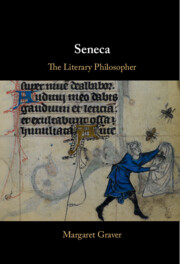Book contents
- Seneca
- Seneca
- Copyright page
- Contents
- Figures
- Preface
- Texts, Translations, and Abbreviations
- Introduction
- Part I Recreating the Stoic Past
- Chapter 1 The Life of the Mind
- Chapter 2 Action and Emotion
- Chapter 3 The Treatise On Benefits
- Part II Rival Traditions in Philosophy
- Part III Models of Emotional Experience
- Part IV The Self within the Text
- Bibliography
- Passages Treated
- Index
Chapter 2 - Action and Emotion
Seneca and the Stoic Tradition
from Part I - Recreating the Stoic Past
Published online by Cambridge University Press: 23 March 2023
- Seneca
- Seneca
- Copyright page
- Contents
- Figures
- Preface
- Texts, Translations, and Abbreviations
- Introduction
- Part I Recreating the Stoic Past
- Chapter 1 The Life of the Mind
- Chapter 2 Action and Emotion
- Chapter 3 The Treatise On Benefits
- Part II Rival Traditions in Philosophy
- Part III Models of Emotional Experience
- Part IV The Self within the Text
- Bibliography
- Passages Treated
- Index
Summary
The chapter reviews the essentials of Seneca’s positions in moral psychology as compared to those of earlier Stoics whose works he might have studied. On the material nature of the mind (or soul); on the mechanisms of thought, belief, and action; and on the nature and management of the emotions, Seneca’s views are consonant with those of his Stoic predecessors; however, his knowledge of the system is not necessarily complete, and his emphases are sometimes different. Thus, he shows some awareness of earlier discussions of phantasia (impressions) but does not explore the topic deeply; on the other hand, he gives assent and impulse the same kind of significance in ethics as Chrysippus had. Contrary to some earlier studies, this chapter does not find Seneca to be innovative as concerns volition (voluntas) or the will. Likewise, his analysis of the emotions and of involuntary emotional response finds parallel in earlier texts. For the good emotions (eupatheiai) of the Stoic sage, he seems to know only that part of the analysis that concerns joy, to which he assigns an important role in his own ethics.
Keywords
- Type
- Chapter
- Information
- SenecaThe Literary Philosopher, pp. 40 - 56Publisher: Cambridge University PressPrint publication year: 2023



